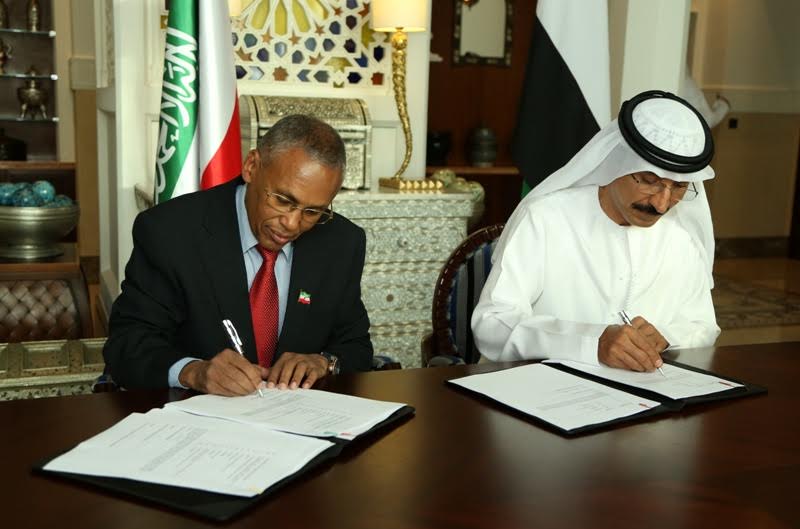UAE continues to pursue a coordinated soft-power strategy throughout its sphere of influence, using political, economic, and military tools to promote its agenda in Somaliland at the expense of neighboring countries
by Judy Maina, Judy.maina@alleastafrica.com
HARGEISA – Plans for a UAE-funded military base in the breakaway northern Somalia republic of Somalland have fueled debates over possible negative impact it may have on the relations between the enclave and its neighboring countries.
This week, the government of the United Arab Emirates had submitted a formal application seeking a permission from Somaliland government to establish a military base in the region as parts of its growing ambition to assert itself in the horn of Africa region.
However, foreign minister Sa’ad Ali Shire declined to say if the government would approve UAE’s request, and cautiously said that Somaliland would not afford to lose its relations with neighboring countries, namely Ethiopia and Djibouti.
Meanwhile, the move had sparked a tough debate among intellectuals, religious leaders and politicians in the region who warned that granting a permission to open a military base in Berbera, Somaliland’s largest port by UAE would hurt relations with Djibouti and Ethiopia that have reportedly warned Somaliland against allowing for the United Arab Emirates to establish a military base in Somaliland.
Ethiopia, a major ally for Somaliland is the only country to have an embassy in Somaliland. Other countries that have relations with Somaliland have merely maintained consulatar missions in the enclave.
Ethiopia also assists Somaliland in maintaining security in Somaliland, a region often considered an oasis of peace in the volatile region.
“It’ll definitely hurt relations between Somaliland and our neighbors especially Ethiopia, therefore I would recommend the government not agree to the UAE’s proposal.” said Mohamed Osman Fadal, the foreign secretary of Wadani, Somaliland’s main opposition party.
The United Arab Emirates had earlier signed a 30-year contract with Somaliland to manage its largest port, Berbera.
According to economic analysts, Berbera’s management by UAE is is parts of retaliatory measures against Djibouti which annulled the Dubai-based ports operator DP World’s terminal contract followed by arbitration proceedings by the Djiboutian government over alleged corruption by the company.
UAE has since cut diplomatic relations with Djibouti and picked Somaliland as its alternative base other than Somalia which signed multiple agreements with Turkey, a long time strategic rival of UAE to run its key economic hubs including Mogadishu port and the International airport.
“Giving a green light to the UAE’s plan to establish a military base in Somaliland will have serious and unintended consequences to the stability of Somaliland.” said Ibrahim Abdillahi Dhagaweyne, one of Somaliland’s most powerful politicians who hails from Berbera town.
“Thus that proposal should be off the limit for Somaliland.”
Meanwhile, religious leaders who rarely added their voice to the political spats in the region also have also objected to the plan, claiming it represents a violation of sovereignty and could potentially have a negative impact on Somaliland’s stability.
“This military base would lead us into to the path a war in the horn of Africa because it’ll put us in a position that we will have to engage war with more powerful countries with mightier military powers than us.” said Sheikh Aden Sira, one of Somaliland’s most respected religious leaders during a sermon after Friday prayers on Friday as a large crowd cheered on.
“The more smart and farsighted politicians in the government oppose that at all.” He said.
Somaliland officials were not available for comment.
In the meantime, Djiboutian and Ethiopian officials are reportedly working behind scenes to convince Somaliland leaders to disallow UAE’s proposal, pending parliament’s approval and president’s signature respectively.
Ethiopia and Djibouti had maintained warm relations with the breakaway republic before it moved to establish economic relations with the United Arab Emirates which analysts said had an impact of their relations.
According to officials, Djibouti’s government has repeatedly warned Somaliland leaders over their decisions to embrace UAE as a closer ally, and allow UAE to maximize its strategic interests in the untapped horn of Africa market.
Djiboutian and Ethiopian officials were not available for comments.
(Editing by John Thiongo)
Copyright ©2016 Alleastafrica.com All rights reserved. The information contained in Alleastafrica.com may not be published, broadcast, rewritten, or redistributed without the prior written authority of Alleastafrica.com (info@alleastafrica.com).



